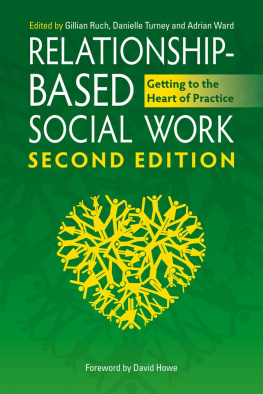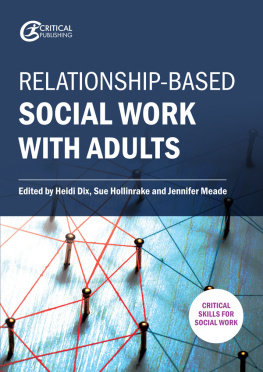Foreword
Of course its never really gone away. It has always been there in social work, one way or another: the practitioners relationship with her client, the service user. Whatever intentions you have, whichever technique you use, the medium in which matters are conducted is the relationship you have with the other, and the other has with you. The quality and character of these relationships therefore matter, they matter a great deal. Not surprisingly, outcomes have been shown to vary depending on the technique used or intervention chosen. However, more critically, outcomes have also been found to vary depending on the skill and quality of the relationship created by the practitioner as she engages with her client, no matter what technique or method she is using. In a sense then, all social work is relationship-based. There is no choice. In which case, its vital that we do it well.
It was back in the late 1960s when I began my career as a social worker. I worked in a pre-Seebohm Childrens Department. One of the books that helped me make sense of what I was doing, and perhaps also what I could and should do, was Margaret Ferard and Noel Hunnybuns 1962 book The Caseworkers Use of Relationships (with a foreword by John Bowlby, no less). Later that same year I came across Isca Salzberger-Wittenbergs 1970 book Psycho-Analytic Insight and Relationships: A Kleinian Approach. This gave my enthusiasm for understanding the way we relate to clients a further boost. Even though over the years the idea of relationship-based social work was destined to go in and out of fashion, I never lost faith in its fundamental importance. Like many of my colleagues, the decades saw me flirt with all manner of ideas and theories, fashions and fads, but wherever the ideological winds were blowing me, I tried to ground whatever I was thinking or doing, researching or writing, on the bedrock of the workerclient relationship. I worried that if social work could no longer see that relationship-based practices were its core strength, then it was in danger of losing its humanity and with that its right to exist in any meaningful way.
The relationship between one human being and another is a complicated, tricky place. There is both confusion and delight as my thoughts, feelings and behaviours affect, and are affected by, your thoughts, feelings and behaviours. This is particularly the case when feelings are running high during moments of anxiety, fear, anger, love, shame, sadness. And social work, of course, is a place where feelings, almost by definition, routinely run high.
The idea of relationship-based social work is therefore both simple and complex. Simple in the sense that it is unavoidable. We all know about relationships because that is the everyday world, personally and professionally, in which we live and have our being. But as weve seen, its also a complex place where there is endless scope for misunderstanding and confusion, connection and collaboration, anger and disappointment, joy and belonging, possibility and hope.
To help us understand and navigate this world, at least in the context of social work, Gillian Ruch, Danielle Turney and Adrian Ward have brought together a number of leading experts to write about relationship-based practice. Packed into these pages are so many good ideas, useful explanations and helpful practices that you will finish the book not only humbler and wiser but also feeling more convinced and determined.
There is a natural logic to the book as each chapter deals with one of the key aspects of doing relationship-based social work. The compilation begins by making the case for relationship-based practices in which there is a need to help the client achieve a balance between their internal and external needs. At times of upset and arousal we seek to regulate our emotions and have them managed and contained. If we can achieve this, then we can begin to think, think about our feelings, our behaviour, our needs and how best to meet them. The theories that help us to understand the relationship and the use of self are outlined, described and discussed.
Social work takes place in a variety of places and over different periods of time. There are excellent chapters on workerclient relationships when encounters are brief, and when they are long term, complex and sustained. There are fascinating chapters on working with strong feelings fear, anger and aggression; hopelessness, despair and depression; love and attraction. And when the work is done, or the relationship, for whatever reasons, has to stop, we learn a lot from the essay that discusses endings, completions and letting go.
So although we may feel that simply living life teaches us how to do relationships, it becomes clear that there is much to understand, learn and improve if we are to do them well. The books final chapters therefore talk about how students can be helped to develop a relationship-based practice, the importance of supervision, and the value of having emotionally intelligent professional leadership. How we learn, how we are supervised, and how we are managed should be consistent with the principles of relationship-based social work. Recognising the importance of practices that are both reflective and reflexive runs as a golden thread throughout the book. Relationship-Based Social Work: Getting to the Heart of Practice celebrates the power of the human relationship to hold and to heal. Read this splendid book and warm your heart and sharpen your mind.
David Howe
Emeritus Professor of Social Work
University of East Anglia, Norwich
Preface to the Second Edition
This second edition of Relationship-Based Social Work: Getting to the Heart of Practice is being published eight years after the first one. Since the appearance of the first edition, macro-level political changes have influenced largely negatively in our view the ways in which individuals, families and groups facing difficulties are perceived, configured and responded to. In the context of these changes we feel that this book is more important than ever for social work practitioners who are working in a politically hostile landscape.
In the substantive chapters we have retained the books overarching focus on psychodynamic and systemic understandings of human behaviour and on professional interventions, but have profiled more explicitly a commitment to anti-oppressive practice and diversity issues. Two new chapters have been included: a chapter on working with service users and carers replaces the first editions service user perspective chapter and an additional chapter focuses on professional leadership in contemporary social work practice, acknowledging the central importance of relationship-based leadership for effective everyday practice.
It is our aim that this second edition will help to equip social workers with relationship-based knowledge, skills and values that resist the adverse effects of the prevailing political agenda, offering hope and new possibilities to people experiencing vulnerability and distress.
Gillian Ruch, Danielle Turney and Adrian Ward
September 2017











